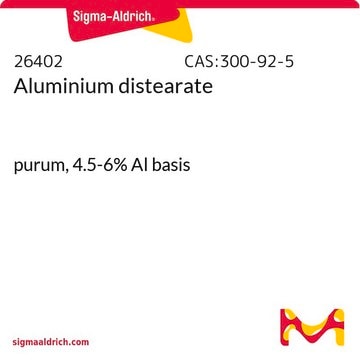247499
Ethyl cellulose
viscosity 100 cP, 5 % in toluene/ethanol 80:20(lit.), extent of labeling: 48% ethoxyl
Sign Into View Organizational & Contract Pricing
All Photos(3)
About This Item
Recommended Products
form
powder or granules
autoignition temp.
698 °F
concentration
48.0-49.5%
extent of labeling
48% ethoxyl
refractive index
n20/D 1.47 (lit.)
viscosity
100 cP, 5 % in toluene/ethanol 80:20(lit.)
transition temp
softening point 155 °C
density
1.14 g/mL at 25 °C (lit.)
Looking for similar products? Visit Product Comparison Guide
General description
Ethyl cellulose is a non-toxic, physiologicallyinert, and stable hydrophobic polymer. It is widely used in the preparation ofsustained release matrices for drug delivery systems.
Application
Ethyl cellulose can be used:
- To prepare polymeric microcapsules of Alachlor and Metolachlor to study their controlled-release properties.
- As a core matrix to synthesize biphasic drug release nanofibers.
- To prepare wax-based solid dispersion pellets with excellent floating and sustained-release ability.
Storage Class Code
11 - Combustible Solids
WGK
WGK 1
Flash Point(F)
Not applicable
Flash Point(C)
Not applicable
Personal Protective Equipment
dust mask type N95 (US), Eyeshields, Gloves
Certificates of Analysis (COA)
Search for Certificates of Analysis (COA) by entering the products Lot/Batch Number. Lot and Batch Numbers can be found on a product’s label following the words ‘Lot’ or ‘Batch’.
Already Own This Product?
Find documentation for the products that you have recently purchased in the Document Library.
Customers Also Viewed
Päivi Grönroos et al.
Sensors (Basel, Switzerland), 19(12) (2019-06-30)
Novel hot electron-emitting working electrodes and conventional counter electrodes were created by screen printing. Thus, low-cost disposable electrode chips for bioaffinity assays were produced to replace our older expensive electrode chips manufactured by manufacturing techniques of electronics from silicon or
Robert Morhard et al.
IEEE transactions on bio-medical engineering, 67(8), 2337-2348 (2019-12-17)
Ethanol ablation, the injection of ethanol to induce necrosis, was originally used to treat hepatocellular carcinoma, with survival rates comparable to surgery. However, efficacy is limited due to leakage into surrounding tissue. To reduce leakage, we previously reported incorporating ethyl
Anurag Verma et al.
Acta pharmaceutica (Zagreb, Croatia), 62(2), 237-250 (2012-07-04)
Chitosan has become a focus of major interest in recent years due to its excellent biocompatibility, biodegradability and non-toxicity. Although this material has already been extensively investigated in the design of different types of drug delivery systems, it is still
N Suwannateep et al.
European journal of pharmaceutics and biopharmaceutics : official journal of Arbeitsgemeinschaft fur Pharmazeutische Verfahrenstechnik e.V, 82(3), 485-490 (2012-09-08)
The phytochemical curcumin possesses antioxidant activity; however, it becomes unstable after being exposed to light or heat or loses activity during storage. This is especially important when curcumin is applied to the skin within a cosmetic or pharmaceutical formulation, since
Xin Li et al.
Die Pharmazie, 67(8), 695-700 (2012-09-11)
A novel osmotic pump tablet with ethyl cellulose (EC) and polyvinyl pyrrolidone (PVP) as the semipermeable membrane and isosorbide-5-mononitrate (5-ISMN) as the model drug was formulated in this study. Zero order release kinetics were attained by avoiding aging during storage.
Our team of scientists has experience in all areas of research including Life Science, Material Science, Chemical Synthesis, Chromatography, Analytical and many others.
Contact Technical Service







